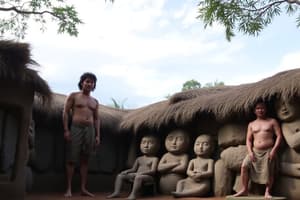Podcast
Questions and Answers
What is the significance of Homo luzonensis in the context of the Philippines?
What is the significance of Homo luzonensis in the context of the Philippines?
- It represents the earliest known human remains in the Philippines. (correct)
- It is linked to the Wave Migration Theory.
- It existed around 10,000 years ago.
- It was discovered only in Southern China.
What does the Wave Migration Theory suggest about the peopling of the Philippines?
What does the Wave Migration Theory suggest about the peopling of the Philippines?
- Migration occurred only once in history.
- Migrations introduced all cultural traits in the archipelago. (correct)
- Humans existed in the Philippines before any migrations.
- Cultural traits in the Philippines are solely indigenous.
Who described the Wave Migration Theory as flawed and lacking evidence?
Who described the Wave Migration Theory as flawed and lacking evidence?
- Austronesian scholars
- Professor H.Otley Beyer
- William Henry Scott (correct)
- Peter Bellwood
The Tabon Man fossils are dated to approximately when?
The Tabon Man fossils are dated to approximately when?
What characterizes the Australoid people according to prehistorians?
What characterizes the Australoid people according to prehistorians?
Which hypothesis suggests that the Austronesians originated from Southern China?
Which hypothesis suggests that the Austronesians originated from Southern China?
What does the Wave Migration Theory imply about human presence in the Philippines before migration?
What does the Wave Migration Theory imply about human presence in the Philippines before migration?
What race is also referred to as the 'Brown Race'?
What race is also referred to as the 'Brown Race'?
What evidence suggests that Homo luzonensis lived in the Philippines?
What evidence suggests that Homo luzonensis lived in the Philippines?
What significant concept does the Wave Migration Theory combine?
What significant concept does the Wave Migration Theory combine?
Which term is used for the earliest known human remains in the Philippines prior to Homo luzonensis?
Which term is used for the earliest known human remains in the Philippines prior to Homo luzonensis?
What criticism did historian William Henry Scott make regarding the Wave Migration Theory?
What criticism did historian William Henry Scott make regarding the Wave Migration Theory?
In what order do the Austronesians supposedly migrated according to Peter Bellwood's hypothesis?
In what order do the Austronesians supposedly migrated according to Peter Bellwood's hypothesis?
What are the two primary groups of people hypothesized as the original settlers of Southeast Asia and the Pacific?
What are the two primary groups of people hypothesized as the original settlers of Southeast Asia and the Pacific?
What timeframe is associated with the dating of the Tabon Man fossils?
What timeframe is associated with the dating of the Tabon Man fossils?
What assumption does the Wave Migration Theory make about the timeline of human presence in the Philippines?
What assumption does the Wave Migration Theory make about the timeline of human presence in the Philippines?
Flashcards
Who was Homo luzonensis?
Who was Homo luzonensis?
An early human species that inhabited Luzon.
What is the Tabon Man?
What is the Tabon Man?
Fossilized fragments of a skull and jawbone dating back to 22,000-20,000 BC.
What is the Wave Migration Theory?
What is the Wave Migration Theory?
A theory suggesting multiple migration waves introduced distinct racial and cultural characteristics to the Philippines.
Who is H. Otley Beyer?
Who is H. Otley Beyer?
Signup and view all the flashcards
Who is William Henry Scott?
Who is William Henry Scott?
Signup and view all the flashcards
Who are the Australoids?
Who are the Australoids?
Signup and view all the flashcards
Who are the Southern Mongoloids?
Who are the Southern Mongoloids?
Signup and view all the flashcards
Who are the Austronesians?
Who are the Austronesians?
Signup and view all the flashcards
What is the Mainland Origin Hypothesis?
What is the Mainland Origin Hypothesis?
Signup and view all the flashcards
Who is Peter Bellwood?
Who is Peter Bellwood?
Signup and view all the flashcards
What is the Island Origin Theory?
What is the Island Origin Theory?
Signup and view all the flashcards
Who is Wilhelm Solheim?
Who is Wilhelm Solheim?
Signup and view all the flashcards
What is Callao Cave?
What is Callao Cave?
Signup and view all the flashcards
What was the first wave of migrants believed to mean?
What was the first wave of migrants believed to mean?
Signup and view all the flashcards
What aspect of culture did the Wave Migration Theory treat as intertwined?
What aspect of culture did the Wave Migration Theory treat as intertwined?
Signup and view all the flashcards
What happened to the population of Australoids?
What happened to the population of Australoids?
Signup and view all the flashcards
Study Notes
Early Human Remains in the Philippines
- Homo luzonensis inhabited Luzon approximately 50,000 to 67,000 years ago, with fossils found in Callao Cave marking the oldest known human remains in the Philippines.
- The Tabon Man, consisting of fossilized fragments of a skull and jawbone from three individuals, dates back to between 22,000 BC and 20,000 BC, representing previously known early humans in the region.
Wave Migration Theory
- Proposed by Professor H. Otley Beyer, this theory suggested multiple waves of migrations introduced distinct racial and cultural characteristics to the Philippines, treating race and culture as intertwined.
- Beyer theorized that the first wave of migrants marked the beginning of human presence in the Philippines, implying no prior human inhabitants.
- The Wave Migration Theory faced criticism, deemed flawed by historian William Henry Scott for its lack of evidence and questionable methodology, and has since been discarded by historians.
Migration Patterns and Austronesians
- Prehistorians generally recognize two primary movements of populations into Southeast Asia and the Pacific:
- Australoids, characterized by very dark pigmentation, generally considered the earlier population.
- Southern Mongoloids, identified as the "Brown Race" or Austronesians, believed to have absorbed or displaced the Australoids.
- Peter Bellwood's Mainland Origin Hypothesis posits that Austronesians migrated from Southern China through Taiwan to the Philippines and beyond.
- Wilhelm Solheim's Island Origin Theory suggests a movement from Mindanao and Northern Indonesia to South China and further downwards.
Early Human Remains in the Philippines
- Homo luzonensis inhabited Luzon approximately 50,000 to 67,000 years ago, with fossils found in Callao Cave marking the oldest known human remains in the Philippines.
- The Tabon Man, consisting of fossilized fragments of a skull and jawbone from three individuals, dates back to between 22,000 BC and 20,000 BC, representing previously known early humans in the region.
Wave Migration Theory
- Proposed by Professor H. Otley Beyer, this theory suggested multiple waves of migrations introduced distinct racial and cultural characteristics to the Philippines, treating race and culture as intertwined.
- Beyer theorized that the first wave of migrants marked the beginning of human presence in the Philippines, implying no prior human inhabitants.
- The Wave Migration Theory faced criticism, deemed flawed by historian William Henry Scott for its lack of evidence and questionable methodology, and has since been discarded by historians.
Migration Patterns and Austronesians
- Prehistorians generally recognize two primary movements of populations into Southeast Asia and the Pacific:
- Australoids, characterized by very dark pigmentation, generally considered the earlier population.
- Southern Mongoloids, identified as the "Brown Race" or Austronesians, believed to have absorbed or displaced the Australoids.
- Peter Bellwood's Mainland Origin Hypothesis posits that Austronesians migrated from Southern China through Taiwan to the Philippines and beyond.
- Wilhelm Solheim's Island Origin Theory suggests a movement from Mindanao and Northern Indonesia to South China and further downwards.
Studying That Suits You
Use AI to generate personalized quizzes and flashcards to suit your learning preferences.





